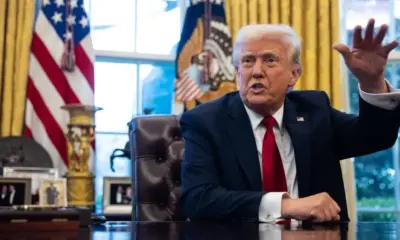News
Democrats’ Potential Comeback Puts Investors on Alert for Policy Changes

Investors are watching Washington closely as the possibility of a Democratic resurgence in upcoming elections raises expectations of policy shifts that could reshape markets. The renewed momentum within the party has sparked debate over future tax policy, spending priorities, and regulatory direction, all factors that could influence key sectors of the US economy.
Recent polls and campaign fundraising trends suggest that Democrats are gaining ground in several battleground states, improving their chances of regaining control of one or both chambers of Congress. While no single issue appears to be driving the shift, analysts point to growing voter focus on healthcare, climate policy, and income inequality as areas that could shape the legislative agenda if Democrats reclaim more influence.
Market strategists say investors are beginning to factor in potential changes to fiscal and regulatory policy. “A stronger Democratic showing could lead to greater emphasis on green infrastructure, higher corporate taxes, and tighter oversight in finance and energy,” said one New York-based portfolio manager. “That mix would create both risks and opportunities depending on how businesses position themselves.”
Equity markets have largely remained steady in recent weeks, though volatility has picked up in sectors seen as sensitive to political outcomes. Renewable energy, healthcare, and technology companies have drawn increased attention from investors assessing which industries might benefit from a policy pivot. Analysts note that a Democratic push for clean energy investment and healthcare expansion could drive capital flows toward those areas, while traditional energy and defense firms might face greater regulatory scrutiny.
Tax policy remains a particular focus for investors. The prospect of a partial reversal of the 2017 corporate tax cuts has resurfaced as a campaign talking point among several Democratic candidates. “If corporate tax rates move higher, that would likely weigh on earnings growth, especially for large multinationals,” said an economist at Bank of America. “However, increased government investment could offset some of that drag through stronger domestic demand.”
Bond markets are also paying attention. Expectations of higher government spending on infrastructure and social programs have led to discussions about potential increases in fiscal deficits, which could push up long-term yields. At the same time, investors see a Democratic-led government as more likely to support green bonds and sustainable finance initiatives, creating new opportunities in the fixed-income space.
The policy uncertainty comes at a time when the Federal Reserve is nearing the end of its tightening cycle, leaving markets more sensitive to fiscal signals. “Monetary policy is stabilizing, so fiscal policy will take on greater importance,” said one strategist at Goldman Sachs. “Any change in spending or taxation priorities will have an outsized impact on growth expectations and asset allocation.”
Still, investors caution against overreacting before the political landscape becomes clearer. Historically, markets have adjusted quickly to new policy directions, often finding equilibrium once legislative priorities are set. “Elections always bring noise,” said a London-based fund manager. “What matters is the balance of power and how campaign promises translate into actual lawmaking.”
As the political season intensifies, investors are expected to remain vigilant. With potential shifts in tax, climate, and trade policy on the horizon, the coming months could redefine how capital flows through major sectors of the economy and determine where the next wave of market opportunity lies.






















